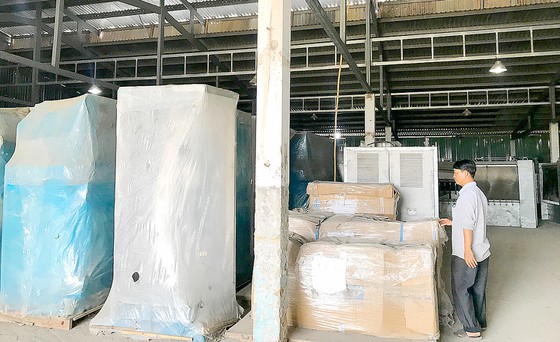 Society
Society


|
| An Hạ Company of HCM City has invested in machinery for a modern slaughterhouse, but construction has been delayed because of sluggish administrative procedures. — Photo of sggp.org.vn |
HCM CITY — Four out of six projects to build modern industrial slaughterhouses in HCM City have been delayed due to sluggish administrative procedures and lack of approval for building permits.
As of October, the city had three industrial slaughterhouses and 11 traditional slaughterhouses with a total capacity of 7,300 pigs and 90,000 poultry per day.
The three industrial slaughterhouses include two new ones with a capacity of 1,700 pigs per day. However, according to the city’s Department of Agriculture and Rural Development, the two new slaughterhouses, Xuân Thới Thượng and Sagri in Hóc Môn District, have not reached their original design capacity.
According to the original plan, all the traditional slaughterhouses in the city were supposed to be shut down by the end of September and replaced with six modern industrial-scale cattle slaughterhouses with a total capacity of 12,000 animals per day.
Hóc Môn District will have two slaughterhouses, including the Xuân Thới Thượng and Tân Hiệp Food Processing plants.
Củ Chi District will have four facilities in Tân Thạnh, Tân Phú Trung, and Phước Thạnh communes, and one on Võ Văn Bích Street.
Nguyễn Thị Hồng Thắm, director of An Hạ Company, which invested machinery for one of the delayed slaughterhouse projects, attributed the problem to a delay in getting a building permit.
The slaughterhouse would be located on more than 387 square metres of land under state management. For nearly a year, the company has been seeking a land-use right permit so that it can request a building permit.
Meanwhile, the Tân Hiệp Food Processing Plant project of Tân Hiệp Cooperative has also faced difficulty in seeking a construction permit.
Although the city set up a unit to support companies, progress has been slow because of administrative hurdles.
According to the Department of Agriculture and Rural Development, all of the 11 traditional slaughterhouses will continue operating until all six modern slaughterhouses are put into use.
If the traditional slaughterhouses are shut down now, slaughtering activities would take place in neighbouring provinces and the city would not have control over disease and food safety. — VNS




